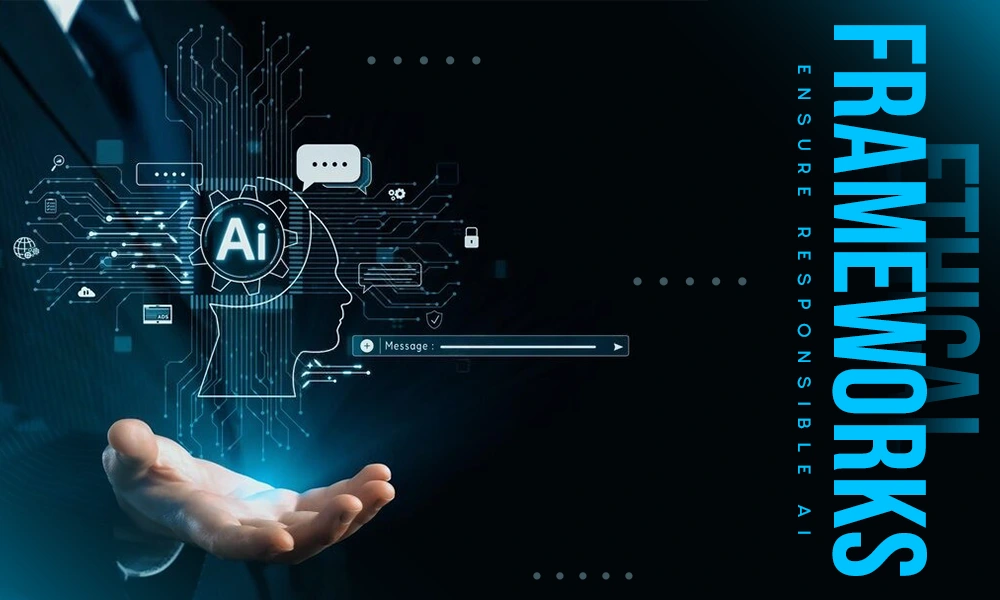The Role of Ethical Frameworks in Enterprise AI Deployment

Key Takeaways
- Responsible AI adoption requires more than technical excellence—it demands a strong ethical foundation prioritizing fairness, transparency, and accountability.
- Ethical AI frameworks guide organizations in aligning innovation with societal values and reducing risks of bias, discrimination, and data misuse.
- Proactive governance builds stakeholder trust, safeguards brand reputation, and ensures compliance with evolving global regulations.
- Enterprises that integrate ethics into every stage of AI development—strategy, design, deployment, and oversight—gain a sustainable competitive advantage.
- Establishing clear ethical standards today helps future-proof businesses against reputational, legal, and technological risks in tomorrow’s AI-driven economy.
Introduction
As artificial intelligence (AI) cements its place across diverse industries, from healthcare and finance to retail and logistics, the need for responsible innovation is more urgent than ever before. Enterprises deploying AI at scale must contend with systems that are not only highly capable but also influential enough to impact real-world outcomes for individuals, communities, and even entire economies.
This reality demands that organizations develop robust ethical frameworks to shape their strategies and protect customers and the business. Such frameworks act as critical guides, ensuring that every advancement in AI is not just innovative for its own sake, but also compliant, trustworthy, and aligned with societal values. As the adoption of AI enterprise software accelerates, the importance of establishing a well-defined ethical foundation for AI operations grows accordingly, helping to future-proof businesses in an era of continuous digital evolution.
Ethical frameworks are not solely about fulfilling organizational goodwill or ticking the box for regulatory requirements. They fundamentally reinforce public confidence, protect brands from reputational harm, and defend companies against potential misuse of technology and unintended adverse consequences. The intersection of technology, policy, and public interest underscores the necessity of structured approaches that proactively mitigate risk and inspire trust among all stakeholders. A company lacking such guidelines risks not just technical errors but also genuine fallout in consumer trust and legal standing.
Key Components of Ethical AI Frameworks
- Transparency and Explainability: AI systems should be designed and developed to provide clear, actionable insight into their logic, processes, and decision-making patterns. This not only reassures users that they are being treated fairly but also enables regulators, auditors, and relevant stakeholders to trace, validate, and review the chain of actions and outcomes that algorithms produce.
- Fairness and Bias Mitigation: Ensuring equitable treatment for all individuals requires systematic identification, assessment, and remediation of algorithmic biases. This point is particularly significant for finance, healthcare, and hiring sectors, where biased outcomes can institutionalize social inequities.
- Accountability and Responsibility: It is critical to define roles and procedures for oversight, so there are clear lines of responsibility for AI-enabled decisions and their potential impacts upon customers, employees, and the broader public. Accountability fosters a culture in which errors are rapidly acknowledged, investigated, and rectified.
- Data Privacy and Security: Upholding customers’ trust requires rigorously securing sensitive information and following all applicable privacy and data sovereignty laws. As digital landscapes become more interconnected and data volumes surge, adhering to the highest standards of data stewardship is not simply good practice—it is a business imperative.
The integration of these principles ensures that the use of AI aligns with universal human rights and the growing expectations of global regulators, as highlighted in ongoing policy explorations by the Brookings Institution. As regulation evolves, enterprises must continuously enhance their frameworks to remain trustworthy and compliant.
Implementing Ethical Frameworks in Enterprises
Creating an ethical AI framework requires more than a simple set of policies; it demands practical, ongoing engagement and cultural buy-in from all business functions. Enterprises should establish cross-functional AI Ethics Committees, develop tailored governance policies responsive to their unique risk profiles, and support these with rigorous review mechanisms that encourage dynamic improvement.
- Establish AI Ethics Committees: These cross-disciplinary teams should bring together leaders from compliance, legal, technology, and the business units most impacted by AI systems, ensuring broad representation and robust debate when setting priorities and protocols.
- Develop Comprehensive Policies: Far from one-size-fits-all, organizations must tailor governance guidelines to address the use cases, operational environments, risk tolerances, and customer expectations unique to their sector and business model.
- Conduct Regular Audits: Routine internal and, where possible, independent external reviews can help uncover blind spots or unintended algorithmic outcomes before they cause harm or draw regulatory attention.
- Provide Ongoing Training: Continuous education and awareness initiatives ensure that technical and non-technical staff members are equipped to embed ethical considerations into their daily work and adapt their practices as technologies and standards evolve.
No matter the tactical strategy or policy sophistication, success depends on highly visible support from leadership and integration into every aspect of enterprise-wide processes—from vendor assessments and technology procurement to day-to-day product development and customer interaction lifecycles.
Challenges in Ethical AI Deployment
Enterprises face numerous complexities when operationalizing AI ethics. First, the increasing sophistication of AI models often makes their inner workings opaque, posing new challenges for transparency and explainability. Maintaining effective, up-to-date ethical controls is an ongoing struggle, as underlying AI technologies evolve at a pace that often outstrips an organization’s capacity to adapt its oversight practices without substantial investment.
- Complexity of AI Systems: Advanced AI tools, such as deep neural networks, can resemble “black box” mechanisms, complicating efforts to interpret and explain outcomes—especially to non-technical audiences and affected end-users.
- Rapid Technological Advancements: The relentless tempo of innovation means new capabilities, architectures, and model types frequently reshape best practices, requiring organizations to continuously update their ethical frameworks and employee training.
- Balancing Innovation and Ethics: With market pressures high and competition fierce, some companies struggle to balance the imperative for rapid deployment with sufficiently thorough ethical vetting—a tension that can result in compliance violations or significant damage to brand reputation.
Final Thoughts
Ethical frameworks are fundamental to deploying AI responsibly and sustainably in modern enterprise. By integrating values such as transparency, fairness, accountability, and rigorous privacy protections into every layer of their AI initiatives, organizations can meet evolving legal mandates and, more importantly, build invaluable reputational and stakeholder trust. Ultimately, responsible AI unlocks innovation’s full potential—so long as it is grounded in intentional strategy and unwavering organizational commitment to ethical conduct and meaningful oversight.









